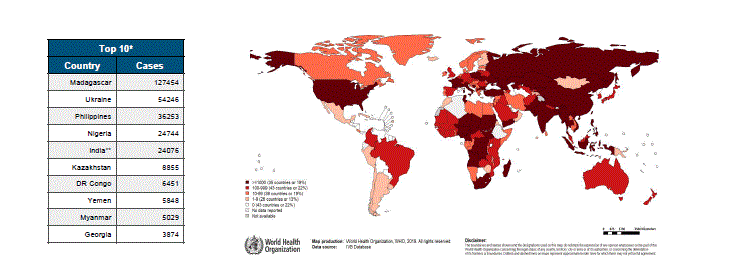A vaccination against the measles virus has been available since 1968 and is given to young children to protect them from this potentially deadly virus. This is a very good thing as measles can attack the central nervous system and cause severe damage – in unvaccinated countries it still accounts for hundreds of thousands of deaths and millions of infections.
The virus is highly infectious, spreading through the air and 9 out of 10 people who come into contact with the virus will get measles. It has been so effective that cases of measles in the UK, US and many other parts of the world are now rare. The graph below illustrates the startling effectiveness of the vaccine program in the US.

Measles hasn’t gone away
Despite this success, the measles virus has not been eliminated worldwide. To be fully effective at stopping new infections arriving from overseas (where vaccinations are not the norm) and triggering a spread of cases, it is important that the majority of the people in a country are still vaccinated (herd immunity). In most countries, vaccination is not compulsory, so future success depends on parents opting their children into the vaccination.
Vaccination rate is falling
Unfortunately, vaccination rates have fallen over the last 10 – 20 years, partly triggered by erroneous suspicion that the vaccine might cause autism or other health problems in young children. This means that the number of cases per year is now rising in countries that had all but eliminated measles which is bad for those who are now vulnerable to infection but a recent research report suggests that the problems run deeper and can directly affect aspergillosis patients amongst many others.

Measles virus destroys antibodies
Researchers have discovered that the measles vaccine works in two ways. Firstly it provides protection against the measles virus – but it also protects the immune system of the immunised person against severe attack. Someone who has had measles (child or adult) can have severely reduced protection from other infections for years as the viral infection also results in a huge loss of antibodies that have been built up over the patient’s lifetime as a consequence of various infections. We need our antibodies so that our immune system can ‘remember’ earlier infections by bacteria, viruses and fungi – it enables us to respond quickly to a new infection. Failure to do so means that we have to experience the infection all over again, with all the risks to our health that that involves.
Aspergillosis patients
Aspergillosis patients, as well as people with other respiratory diseases, have a strong tendency to get more lung infections, These infections exacerbate their asthma symptoms and can make breathing so difficult a hospital admission is needed to provide oxygen and long courses of antibiotics are often important. The National Aspergillosis Centre in Manchester, UK has learned that vaccinating patients against these infections, where possible, is helpful as it controls exacerbations of the condition, reduced admissions and improves patients quality of life,
It may now be the case that aspergillosis patients will need to be checked to ensure that they are not at risk of getting measles, as succumbing to the virus could leave them even more vulnerable to secondary respiratory infections.